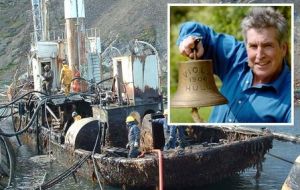MercoPress. South Atlantic News Agency
Plans to restore historic trawler from the ‘Great War’ rusting in South Georgia
 Dr Robb Robinson of the Maritime Historical Studies Centre in Hull, with the bell from the Viola, which is rusting in South Georgia
Dr Robb Robinson of the Maritime Historical Studies Centre in Hull, with the bell from the Viola, which is rusting in South Georgia An historic trawler, originally from the city of Hull could be returned to the city as part of commemorations to mark the centenary of the First World War. The ‘Viola’, which is currently rusting in South Georgia, is the last remaining boat of its kind to have fought in what was known as the “Great War”.
Now, campaigners, including a University of Hull academic, hope events being planned next year could provide an opportunity to bring the trawler home.
Dr Robb Robinson said: “The Viola sailed from Hull barely a few weeks after the war started and, a century later, it has yet to return.
”I looked into the idea a few years ago but we couldn't get enough momentum behind the campaign. The centenary commemorations are probably the last chance to bring it back.“
The ‘Viola’ was one of hundreds of trawlers seized by the Government at the outbreak of war in 1914 and turned into fighting boats. It served in the Shetlands and on the River Tyne.
After the Government requisitioned the ‘Viola’, it was armed and initially sent to Lerwick in the Shetland Islands on anti- submarine patrols. The skipper's wife and family moved from Hull to be with him.
Later, it was switched to minesweeping duties, operating out of Tynemouth, where it was involved in sinking a U-boat with the help of airships, believed to be the first time airships helped sink an enemy vessel.
Dr Robinson said: ”The ‘Viola’ was built in 1906 within three weeks of the HMS Dreadnought. But while Dreadnought sank one U-boat, the Viola sank two.“
After 1914 the boat was sold to new owners in Norway, renamed Dias and used for whaling off the coast of Africa, before being sold again to an Argentine firm, which used it for sealing and exploratory trips in the Falklands.
Although mothballed in the 1960s, it played a minor role in the Falklands War when scrap metal merchants coming ashore on South Georgia – where the boat rested – pre-empted the conflict.
Dr Robinson, who works at the Maritime Historical Studies Centre in Hull, believes it would cost about £500,000 to bring the boat back on a barge and a further £1m to restore it.
He said: ”This boat is unique; its story is a voyage through the 20th century. For me, it would be a dream to see it come back after all this time”.




Top Comments
Disclaimer & comment rules-

Read all commentsI do hope they save this old ship! :) we've destroyed far to much of our maritime history already.
Jun 20th, 2013 - 11:22 am 0Commenting for this story is now closed.
If you have a Facebook account, become a fan and comment on our Facebook Page!